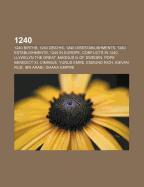1240
BücherAngebote / Angebote:
Source: Wikipedia. Pages: 71. Chapters: 1240 births, 1240 deaths, 1240 disestablishments, 1240 establishments, 1240 in Europe, Conflicts in 1240, Llywelyn the Great, Magnus III of Sweden, Pope Benedict XI, Cimabue, Yunus Emre, Edmund Rich, Kievan Rus', Ibn Arabi, Ghana Empire, Abraham Abulafia, Tr¿n Thánh Tông, University of Siena, Razia Sultana, Battle of the Neva, William VII, Marquess of Montferrat, Volga Bulgaria, Albert II, Margrave of Meissen, Constance of Hungary, Daumantas of Pskov, Isabel Marshal, Raymond Nonnatus, Siger of Brabant, Nikephoros I Komnenos Doukas, Skule Bårdsson, John de Lacy, 2nd Earl of Lincoln, Ludmilla of Bohemia, Margaret of England, Matthew of Aquasparta, Arnolfo di Cambio, Jamal-ud-Din Yaqut, Robert IV, Count of Nassau, Sa'ad al-Dawla, Patriarch Germanus II of Constantinople, Gerard Segarelli, John I Doukas of Thessaly, List of state leaders in 1240, Bishopric of Reval, Blackfriars, Perth, Thomas de Multon, Lord, Siege of Kiev, Baindt Abbey, Henry VI, Count of Luxembourg, Anastasia of Greater Poland, Walter de Lacy, Lord of Meath, Adenes Le Roi, Hugh, Count of Brienne, Emperor Duzong of Song, William de Warenne, 6th Earl of Surrey, Infanta Branca, Lady of Guadalajara, Alexander of Villedieu, Castello Maniace, Konrad von Thüringen, Serapion of Algiers, Caesar of Heisterbach, Gherardo III da Camino, Henri de Dreux, Bonvesin da la Riva, John Fitzalan, Lord of Oswestry, Andronikos II of Trebizond, Simon VI de Montfort, Tbeli Abuserisdze, Jehan de Braine, Bernard de Castanet, Jon Smør, Hartmann, Count of Württemberg, Ronald Crawford, Humbert I of Viennois, Konrad of Lichtenau, Sibylla of Armenia, Sylvester of Assisi, Maol Choluim, Earl of Angus, Leo Gabalas, Paul and Ninety Companions, Hojo Tokifusa, Giovanni Soranzo, Alan of Beccles, Conrad de Lichtenberg, Albert of Pisa, Uthman ibn Abd al-Haqq, Bernard of Trilia, Balian of Ibelin, 1240 in poetry. Excerpt: Kievan Rus' or Rus' was a medieval polity in Eastern Europe, from the late 9th to the mid 13th century, when it disintegrated under the pressure of the Mongol invasion of 1237-1240. Contemporarily, the state was known as "land of the Rus'" (Old East Slavic , from the ethnonym , Greek , Arabic ), in Greek as , latinized , later also . The name "Kievan Rus'" (Russian: ) was coined much later in the 19th century in Russian historiography to distinguish the early polity from successor states, which also called Rus in their title. Also in the 20th century, the Russian term was rendered in Belarusian and Ukrainian as and , respectively. The polity originates with the conquest of the East Slavic town of Kiev by Varangians, who were referred to as "Rus'", in 864. The early phase of the state is sometimes known as the "Rus Khaganate", while the history of Rus' proper begins in 882, when the capital was moved to Kiev from Veliky Novgorod. The state reaches its zenith in the mid 11th century, when it encompassed territories stretching south to the Black Sea, east to Volga, and west to the Kingdom of Poland and the Grand Duchy of Lithuania. The reigns of Vladimir the Great (980-1015) and his son Yaroslav I the Wise (1019-1054) constitute the "Golden Age" of Kiev, which saw the acceptance of Christianity and the creation of the first East Slavic written legal code, the Russkaya Pravda ("Justice of Rus"). The state declined beginning in the later 11th and during the 12th century, disintegrating into various rival regional powers. It was further weakened by economic factor...
Folgt in ca. 5 Arbeitstagen




